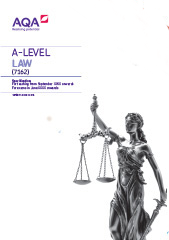3.5 Human Rights
Content | Additional information |
|---|---|
| Rules in Human Rights law | Rules and principles of law relating to the right to life, to liberty and security of person, to privacy, to freedom of expression, and to freedom of assembly and association, as regonised by the European Convention on Human Rights and in the United Kingdom. |
Theory in Human Rights |
|
Human Rights in international law | The Second World War and its aftermath. The United Nations and the Universal Declaration of Human Rights 1948. The Council of Europe and the European Convention on Human Rights 1953. |
Human Rights in the United Kingdom prior to the Human Rights Act 1998 | The status of the European Convention on Human Rights in the United Kingdom, and the impact of decisions of the European Court of Human Rights. |
Human Rights in the United Kingdom after the enactment of the Human Rights Act 1998 | Extent and method of incorporation and interpretation of the provisions of the European Convention on Human Rights. Impact on constitutional arrangements and on law in the United Kingdom including entrenched nature of the Human Rights Act 1998 in the devolutionary settlement of Scotland and Northern Ireland. Criticisms of Human Rights. |
The European Convention on Human Rights 1953 Article 2 of the European Convention on Human Rights 1953 | Article 2.1: right to life Article 2.2: justified exceptions. |
| Article 5 of the European Convention on Human Rights 1953 | Article 5.1: right to liberty and security of person. Article 5.1a–5.1c: justified deprivation of liberty – lawful arrest or detention. Article 5.2–5.5: additional requirements to justify deprivation of liberty in cases of lawful arrest or detention. |
| Article 8 of the European Convention on Human Rights 1953 | Article 8.1: right to respect for private and family life, his home and for his correspondence. |
| Article 10 of the European Convention on Human Rights 1953 | Article 10.1: right to freedom of expression.
|
| Article 11 of the European Convention on Human Rights 1953 | Article 11.1: right to freedom of peaceful assembly and to freedom of association with others. |
| Restrictions | Article 8.2, Article 10.2 and Article 11.2: restrictions on the rights under Article 8.1, Article 10.1 and Article 11.1. General requirements relating to restrictions. |
| Enforcement | Claims before the European Court of Human Rights; the role of domestic courts; the effect of decisions on states and claimants. The process of judicial review. |
Human Rights and English law | The right to life: an outline of criminal and civil law provisions and investigatory procedures.
Deprivation of liberty. Privacy and communication: criminal and civil law provisions which protect or restrict the rights. Expression, assembly and association: in addition to relevant provisions identified above which impact on the balance between privacy and the right to freedom of expression, assembly and association. |
| Reform | Reform of the protection of Human Rights in the UK. |
